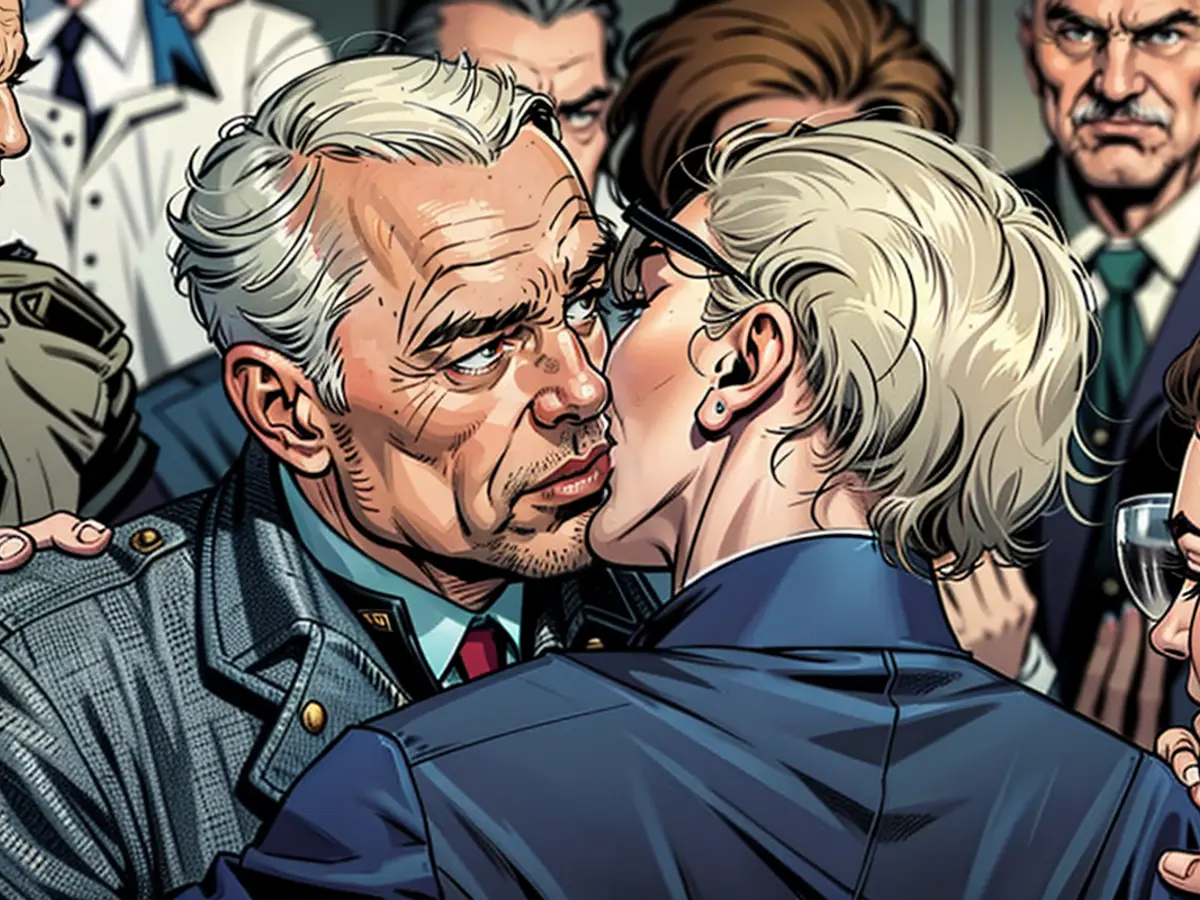The Former German Democratic Republic's Impact Persists
On October 7, 1949, the German Democratic Republic (GDR) was established. There won't be any celebrations marking its 75th anniversary. A historian questions, "Why celebrate the establishment of a dictatorship?" The lingering effects of Germany's division for over 3 decades are still prevalent today.
The last grand celebration took place 35 years ago. Along Karl-Marx-Allee, gray-suited men gaze at passing helmets, tanks, and rocket launchers. The slogan "40 Years of GDR" looms over a hammer and compass, while marching music plays in the background. Erich Honecker, State Council Chairman, smirks, with Mikhail Gorbachev, Kremlin chief, by his side. It's October 7, 1989.
Celebrations are unlikely for the 75th anniversary. Unlike the 75th anniversary of the Federal Republic in May, the GDR's establishment anniversary in 1949 will be commemorated quietly. Instead, it will be remembered as a day marking the peaceful revolution 35 years ago and the Day of German Unity on October 3.
Anna Kaminsky, the director of the Foundation for Processing the SED Dictatorship, approves this approach: "Why celebrate the establishment of a dictatorship?" Even so, she emphasizes the importance of understanding the historical context. The establishment of the second German post-war state marked over 40 years of German division, an experience that still resonates deeply with millions of people.
Historically, the GDR has impacted personal perspectives and expectations of state institutions, state action, and democracy. Many ex-GDR residents express surprisingly favorable views of the now-faded SED state. A survey by Leipzig University researchers in 2023 discovered that two-thirds of East Germans harbor nostalgic feelings for the GDR.
Was the division of Germany predestined?
A brief reminder: The GDR came into existence after the war's victorious powers clashed, and the occupation zones diverged. The introduction of the Deutsche Mark in the West in 1948 intensified tensions.
After establishing the Federal Republic with the proclamation of the Basic Law in May 1949, the Soviet Union felt compelled to match its occupation zone. In his first government statement on October 12, 1949, GDR Prime Minister Otto Grotewohl accused the Western powers' separate state in Bonn of being the "peak of Germany's division." The need for strong leadership arose due to the "looming threat of an imperialist war." "To address this challenge, we constituted the German Democratic Republic and formed a provisional government."
Whether the division could have been avoided, and whether the Federal Republic's government should have accepted Soviet Union offers, is a topic that has sparked debates for decades. Historian Wolfgang Benz concluded in a comprehensive analysis: "Germany's division seemed unavoidable."
Kaminsky concurs. "Preventing it was impossible," says the social scientist born in Gera. "The Soviet Union demanded that all of Germany adhere to their conditions – no democracy, no free elections, no civil liberties."
The GDR was a nation that saw hundreds of thousands taking to the streets for more freedom in 1953, only to be met with brutal tank intervention. By 1990, an estimated 3.8 million people had fled the GDR. It erected a wall, employing over 600,000 individuals in state security to monitor its citizens. Estimates suggest that up to 250,000 people were jailed for political reasons.
Yet, the GDR was also a land where families were formed, work was done, schools were attended, and leisure activities like lake swimming and Baltic Sea sunbathing were enjoyed. It was a nation known for its confirmations, company sports, multifunctional tables, and prefabricated apartments, speed cameras, and canned mackerel. It was a country that embraced its unique goods, tastes, and scents, customs, and everyday life, eventually disappearing.
Half a million individuals are drawn to the familiar or unfamiliar realm of the DDR Museum in Berlin every year, which recently reprinted the practical handbook "DDR Guide – Journey into a Former State." Does the museum encourage Ostalgie? "Not at all," says Stefan Wolle, the museum's scientific director. "We reject that." Although certain visitors may harbor nostalgic sentiments, "that's not our goal," says Wolle. "We even receive complaints that we portray the 'idyllic DDR' too mockingly and 'poorly.'" Wolle claims he can't take the critical view of the defunct state seriously.
"Yep, back in the day, around 30 to 40 years ago, things were way better," shares the 73-year-old historian, hailing from Halle an der Saale. "That's true, I was younger and had all the time in the world ahead of me." However, those yearning for the past should envision enduring life in the DDR for an extra week: "Waiting in line for bread, waiting in line for meat, and no more veggies in Konsum. You can't get construction materials, can't get a car, can't even get a phone. And don't forget the party meetings, the constant Stasi surveillance, the pre-planned demonstrations and parades, the public media's disingenuousness. A week of this, and we'd be ready for another revolt."
Interestingly, Wolle avoided the jubilant events of October 7, 1989, his 40th birthday marked by the grand parade on Karl-Marx-Allee. "Instead, we held a protest on Alexanderplatz every 7th of the month," Wolle recalls, "a demonstration against the electoral fraud of May 7." Thus, Wolle, like countless others in various regions, chose to protest. Two days later, approximately 70,000 people marched around Leipzig's Ring, a pivotal moment in the peaceful revolution. This year, on its 35th anniversary, the primary cause for celebration is the Berlin Wall's fall. On October 9, Federal Chancellor Olaf Scholz will address the crowd in Leipzig.
Despite the calls for quiet commemoration, the 1989 celebrations for the GDR's establishment anniversary were far from muted. Along Karl-Marx-Allee, grand celebrations took place, with gray-suited men saluting passing military displays and Erich Honecker leading the festivities.
The establishment of the GDR in 1949 was closely associated with the Stasi, the notorious secret police force. The oppressive nature of the Stasi was a stark reality for many citizens, with estimates suggesting up to 250,000 people were jailed for political reasons during its existence.








